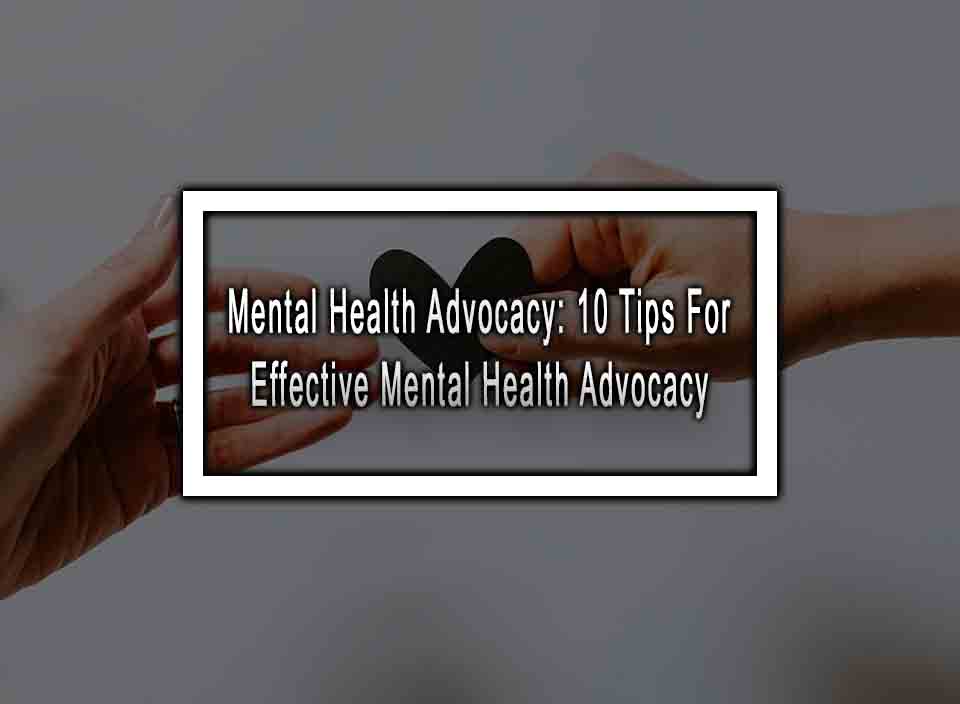Table of Contents
ToggleHere Are Some Effective Tips For Mental Health Advocacy
Mental health advocacy is critical to raise awareness about mental health issues and promote access to equitable mental health care. Advocacy involves encouraging the adoption of policies that prioritize mental health, removing stigma and discrimination against persons living with mental illness, and supporting individuals experiencing mental challenges. In this article, we share ten tips for effective mental health advocacy.
1. Educate yourself and others about mental health
It is essential to learn about mental health challenges, including their symptoms, risk factors, treatments, and prevention. Also, understanding the impact of stigma and discrimination on persons living with mental health issues can inform more effective advocacy strategies.
2. Use social media to raise awareness
Social media is a powerful tool for advocacy. Posting informative graphics and videos, participating in online campaigns, and promoting mental health events are excellent ways to raise awareness about mental health.
3. Write to your local politician
Communicating with your elected officials about mental health policies and funding can make a significant impact. Sending letters and emails, attending town halls, and meeting with your representatives can help shape mental health policies and priorities.
4. Attend mental health conferences and events
Attending mental health conferences and events can provide opportunities to network with advocates, healthcare professionals, and policymakers. Attending these events can also facilitate learning about current issues and research in mental health.
5. Join a mental health organization
Joining a mental health organization can provide a platform for advocacy, mental health education, and support. Organizations like the National Alliance on Mental Illness (NAMI) offer various opportunities for advocacy and outreach.
6. Engage with the media
Engaging with the media by writing opinion pieces and letters to the editors can help raise awareness about mental health issues. You can also submit stories about mental health challenges, their impact, and existing policies to promote change.
7. Share personal experiences to combat stigma
Sharing personal experiences about living with mental health issues to help reduce the stigma often associated with these conditions. Speaking openly about mental health encourages others to seek help and access care.
8. Sponsor and fundraise for mental health research
Sponsoring and fundraising for mental health research can help support the development of innovative treatments and interventions for mental health challenges.
9. Advocate for workplace mental health policies
Promoting mental health policies in the workplace can help create a supportive environment for individuals experiencing mental health challenges. Policies to encourage flexible work hours, remote work, and mental health support benefits can be put in place.
10. Develop alliances and partnerships
Developing alliances and partnerships with other mental health advocacy groups, mental health professionals, and community organizations can provide opportunities for collaboration, learning, and shared resources.
Conclusion
Advocacy is critical to ensuring that individuals facing mental health challenges have access to equitable care and support. By following the ten tips discussed in this article, you can help raise awareness, increase access to services, and reduce the stigma associated with mental health conditions. Let’s work together to prioritize mental health and well-being in our communities and beyond.
Mental Health Advocacy FAQ
Here are the most common questions about mental health advocacy.
Who can be a mental health advocate?
Anyone can be a mental health advocate. It can be people with lived experience of mental illness, family members, healthcare professionals, or anyone who cares about improving mental health services.
How can I become a mental health advocate?
You can become a mental health advocate by educating yourself about mental health issues, volunteering with mental health organizations, sharing your own mental health story, or contacting your elected officials to support mental health policies.
What are some mental health advocacy issues?
Some mental health advocacy issues include access to mental health care for all, reducing stigma surrounding mental illness, improving mental health education, promoting good mental health practices, and advocating for research to better understand mental health.
How can mental health advocacy help people?
Mental health advocacy can help people by improving access to mental health care, reducing the stigma surrounding mental illness, promoting good mental health practices, raising awareness about mental health issues, and advocating for policies that improve mental health services.












